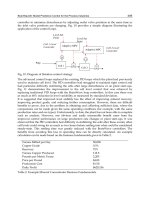Automatic Flight Control Systems Latest Developments Part 15 pot
Bạn đang xem bản rút gọn của tài liệu. Xem và tải ngay bản đầy đủ của tài liệu tại đây (898.29 KB, 4 trang )
Tool-Based Design and Evaluation of Resilient Flight Control Systems
201
Current flight simulators, however, are considered inadequate for the simulation of many
upset conditions as the aerodynamic models are only applicable to the normal flight
envelope. Upset conditions can take the aircraft outside the normal envelope where aircraft
behaviour may change significantly, and the pilot may have to adopt unconventional
control strategies (Burks, 2009). Furthermore, standard hexapod-based motion systems are
unable to reproduce the high accelerations, angular rates, and sustained G-forces occurring
during upsets and the recovery from adverse conditions.
The European Seventh Framework Program Simulation of Upset Recovery in Aviation
(SUPRA, 2009-2012) aims to improve the aerodynamic and the motion envelope of ground-
based flight simulators required for conducting advanced upset recovery simulation. The
research not only involves hexapod-type flight simulators but also experimental centrifuge-
based simulators (Figure 16). The aerodynamic modeling within the SUPRA project employs
a unique combination of engineering methods, including the application of validated CFD
methods and innovative physical modeling to capture the major aerodynamic effects that
occur at high angles of attack. The flight simulator motion cueing research within SUPRA
aims to extend the envelope of standard FFSs by optimizing the motion cueing software. In
addition, the effectiveness of the application of a new-generation centrifuge-based
simulations are investigated for the simulation of G-loads that are typically present in upset
conditions. Information on the SUPRA program can be found in reference (Groen et al.,
2011) and is also available via the website of the project (www.supra.aero).
Fig. 16. SUPRA simulation facilities for conducting advanced upset recovery simulation
research to improve pilot training in upset recovery and reduce LOC-I accident rates.
Left: NLR Generic Research Aircraft Cockpit Environment (GRACE). Mid: TsAGI PSPK-102.
Right: TNO/AMST Desdemona
8. Summary and conclusion
A benchmark for the integrated evaluation of new fault detection, isolation and
reconfigurable control techniques has been developed within the framework of the
European GARTEUR Flight Mechanics Action Group FM-AG(16) on Fault Tolerant Control.
Validated against data from the Digital Flight Data Recorder (DFDR), the benchmark
addresses the need for high-fidelity nonlinear simulation models to improve the prediction
of reconfigurable system performance in degraded modes. The GARTEUR RECOVER
benchmark is suitable for both offline design and analysis of new fault tolerant flight control
system algorithms and integration on simulation platforms for piloted hardware in the loop
Automatic Flight Control Systems – Latest Developments
202
testing. In conjunction with enhanced graphical tools, including high resolution aircraft
visualisations, the benchmark supports tool-based advanced flight control system design
and evaluation within research, educational or industrial framework.
The GARTEUR Action Group FM-AG(16) on Fault Tolerant Control has made a significant
step forward in terms of bringing novel “intelligent” self-adaptive flight control techniques,
originally conceived within the academic and research community, to a higher technology
readiness level. The research program demonstrated that the designed fault tolerant control
algorithms were successful in recovering control of significantly damaged aircraft.
Within the international aviation community, urgent measures and interventions are being
undertaken to reduce the amount of loss-of-control accidents caused by mechanical failures,
atmospheric events or pilot disorientation. The application of fault tolerant and
reconfigurable control, including aircraft envelope protection, has been recognised as a
possible long term option for reducing the impact of flight critical system failures, pilot
disorientation following upsets or flight outside the operational boundaries in degraded
conditions (e.g. icing). Fault tolerant flight control, and the (experimental) results of this
GARTEUR Action Group, may further support these endeavours in providing technology
solutions aiding the recovery and safe control of damaged aircraft or in-flight upset
conditions. Several organisations within this Action Group currently conduct in-flight loss
of control prevention research within the EC Framework 7 program Simulation of Aircraft
Upsets in Aviation SUPRA (www.supra.aero). The experience obtained by the partners in
this Action Group will be utilised to study future measures in mitigating the problem of in-
flight loss-of-control and upset recovery and prevention.
Fig. 17. The GARTEUR FM-AG(16) Fault Tolerant Flight Control project website provides
information on the project, links to ongoing research, publications and software registration
(www.faulttolerantcontrol.nl)
Tool-Based Design and Evaluation of Resilient Flight Control Systems
203
The results of the GARTEUR research program on fault tolerant flight control, as described
in this chapter, have been published in the book 'Fault Tolerant Flight Control - A
Benchmark Challenge' by Springer-Verlag (2010) under the Lecture Notes in Control and
Information Sciences series (LNCIS-399) (Edwards et al., 2010). The book provides details of
the RECOVER benchmark model architecture, mathematical models, modelled fault
scenarios and examples for both offline and piloted simulation applications. The GARTEUR
RECOVER benchmark simulation model, which accompanies the book, is available via the
project’s website (www.faulttolerantcontrol.nl) after registration. The website (Figure 17)
provides further access to contact information, follow-on projects and future software
updates.
9. Acknowledgements
The authors recognise the contributions of the members of the GARTEUR FM-AG(16)
Action Group to this chapter. The authors also appreciate the funding that the Dutch
Technology Foundation STW has provided as part of the GARTEUR activities. Special
thanks to Jaap Groeneweg and Ronald Verhoeven of NLR for their contribution to the
RECOVER aircraft visualisation tools. A word of thanks to all those who have contributed to
the further improvement of the GARTEUR RECOVER benchmark model within their flight
control research programmes, especially Andres Marcos of DEIMOS Space and Gary Balas
of the University of Minnesota. The authors would like to thank the SUPRA consortium and
especially Eric Groen of the Netherlands Organisation for Applied Scientific Research
(TNO) for their contribution to this chapter. The SUPRA project is co-financed by the
European Commission under Grant Agreement no. 233543.
10. References
Burcham, F.W. & Fullerton, C.G. (2004). Manual Manipulation of Engine Throttles for
Emergency Flight Control, NASA/TM-2004-212045
Burks. B. (2009). Upset Recovery Training: A Call for a Higher Standard of Training, Royal
Aeronautical Society Flight Simulation Conference: Towards the Edge of the Envelope,
Royal Aeronautical Society, London, UK, June 3-4, 2009
Civil Aviation Authority of the Netherlands. (2007). Civil Aviation Safety Data
Corder, M. (2004). Crippled But Not Crashed. Scientific American, (July 2004)
Edwards, C., Lombaerts, T.J.J. & Smaili, M.H. (Ed(s).). (2010). Fault Tolerant Control – a
Benchmark Challenge, Lecture Notes in Control and Information Sciences (LNCIS-
399), Springer-Verlag, ISBN 978-3-642-11689-6
Ganguli, S., et al. (2005). Piloted Simulation of Fault Detection, Isolation and Reconfiguration
Algorithms for a Civil Transport Aircraft, Proceedings of AIAA Guidance, Navigation
and Control Conference, AIAA-2005-5936, San Francisco, California, 2005
Groen, E., Fucke, L., Goman, M., Biryukov, V. & Smaili, M.H. (2011). Improving Flight
Safety by Pushing the Training Envelope: The European Project SUPRA,
Proceedings of the 3
rd
CEAS Air & Space Conference / 21
st
AIDAA Congress, Venice,
Italy, October 24-28, 2011
Lombaerts, T.J.J. et al. (2006). Assessment Criteria as Specifications for Reconfiguring
Control, Proceedings of AIAA Guidance, Navigation and Control Conference, Keystone,
Colorado, USA, August, 2006
Automatic Flight Control Systems – Latest Developments
204
Lombaerts, T.J.J., Chu, P., Mulder, J.A. & Joosten, D.A. (2011). Modular Flight Control
Reconfiguration Design and Simulation. Control Engineering Practice, Elsevier, Vol.
19, No. 6, (2011), pp. 540–554, DOI: 10.1016/j.conengprac.2010.12.008
Marcos, A., Balas,G.J. (2001). Linear Parameter Varying Modeling of the Boeing 747-100/200
Longitudinal Motion, Proceedings of AIAA Guidance, Navigation and Control
Conference, AIAA-2001-4347, Montreal, Canada, 2001
NASA. (2011). Aviation Safety Program, In: Aviation Safety Program Fact Sheet (NF-2011-04-
535-HQ), 09.09.2011, Available from
Netherlands Aviation Safety Board. (1994). EL AL Flight 1862, Aircraft Accident Report 92-11,
Hoofddorp
Patton, R.J. (1997). Fault-Tolerant Control Systems: The 1997 Situation, Proceedings of the
IFAC Symposium on SAFEPROCESS, pp. 1033-1055, Hull, UK, August, 1997
Stroosma, O., Smaili, M.H. & Mulder, J.A. (2009). Pilot-in-the-Loop Evaluation of Fault
Tolerant Flight Control Systems, Proceedings of the IFAC SAFEPROCESS 2009
Conference, Barcelona, Spain, 2009
Smaili, M.H. (1997). Flight Data Reconstruction and Simulation of EL AL Flight 1862,
Graduation Report, Delft University of Technology, Delft
Smaili, M.H. & Mulder, J.A. (2000). Flight Data Reconstruction and Simulation of the 1992
Amsterdam Bijlmermeer Airplane Accident, Proceedings of AIAA Modeling and
Simulation Conference, AIAA-2000-4586, Denver, Colorado, August, 2000
The Boeing Company. (1999). Intelligent Flight Control: Advanced Concept Program – Final
Report, BOEING-STL 99P0040
Wright Laboratory. (1991). Self-Repairing Flight Control System, Final Report, WL-TR-91-3025
Zhang, J. & Jiang, J. (2003). Bibliographical Review on Reconfigurable Fault-Tolerant Control
Systems, Proceedings 5
th
IFAC Symposium on Fault Detection, Supervision and Safety for
Technical Processes 2003, Washington, D.C., USA, June 9-11, 2003
Zhang, Y. (2005). Fault Tolerant Control Systems: Historical Review and Current Research,
Presented at the Centre de Recherche en Automatique de Nancy, Universite Henri
Poincare, Nancy 1, France, December 5, 2005









